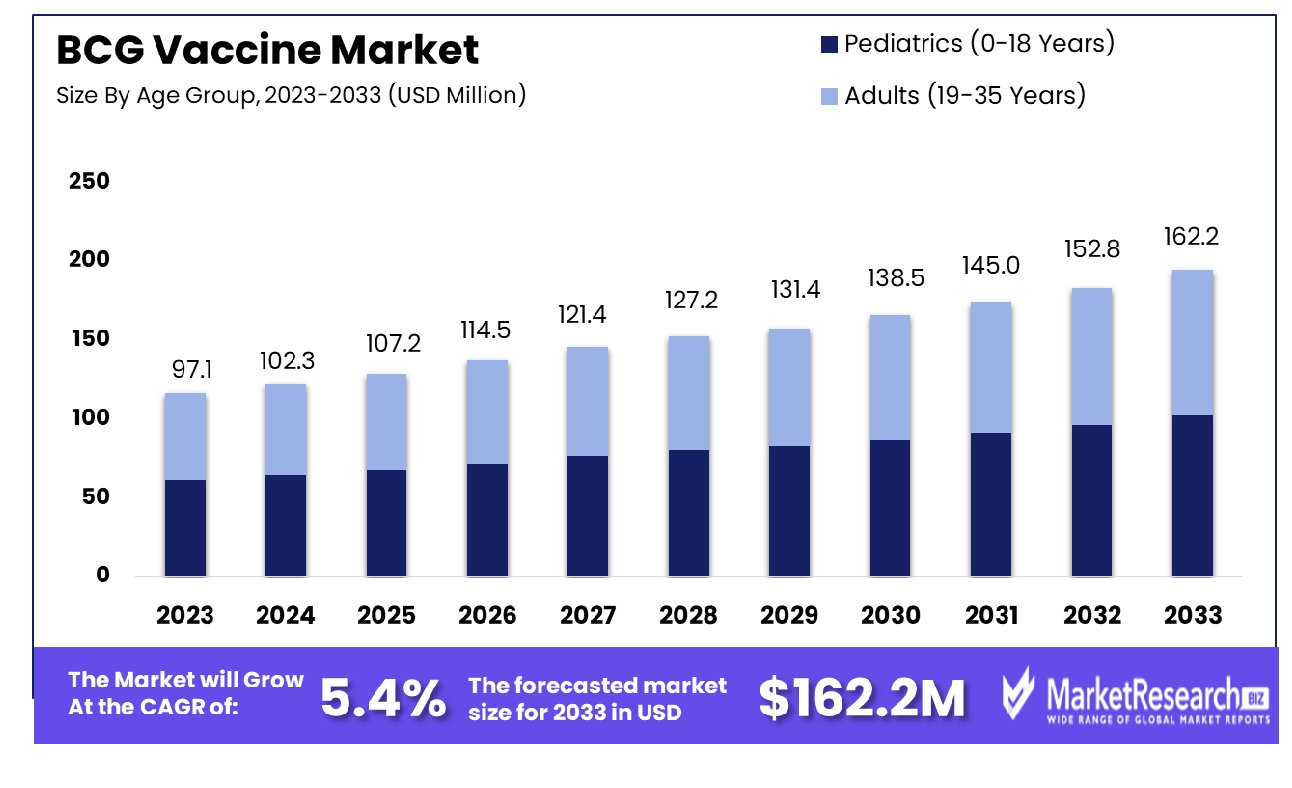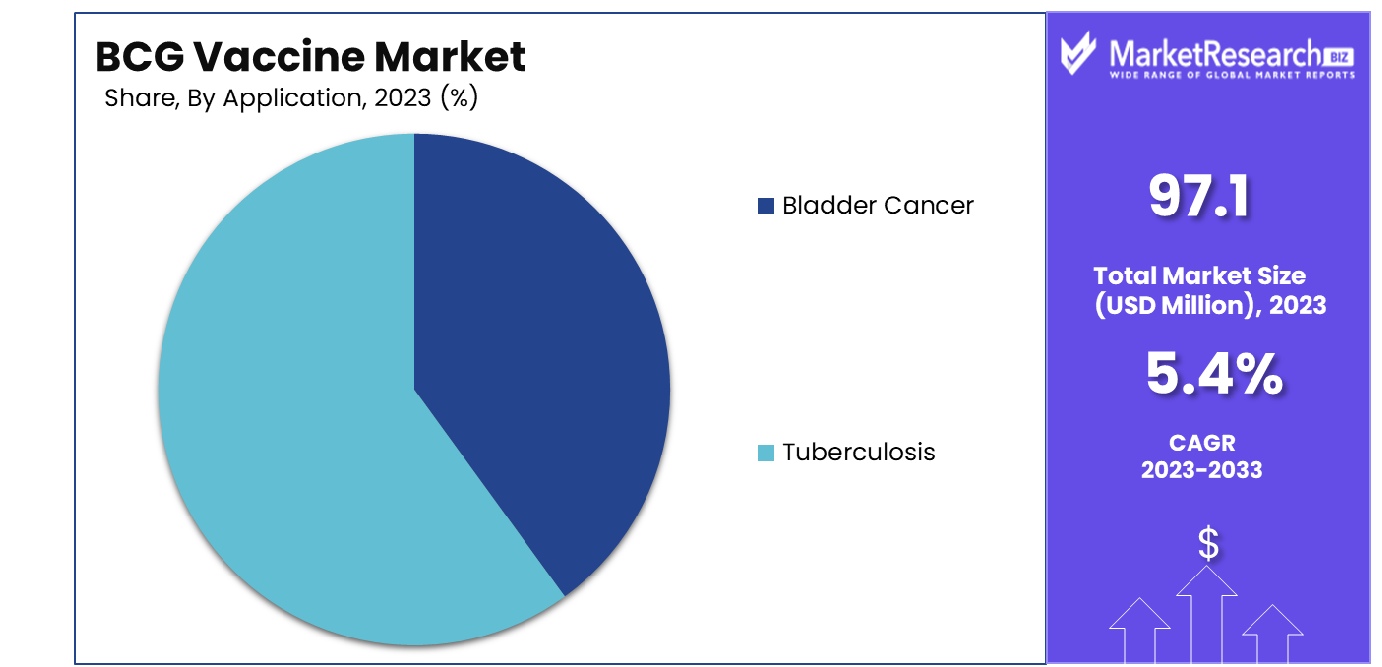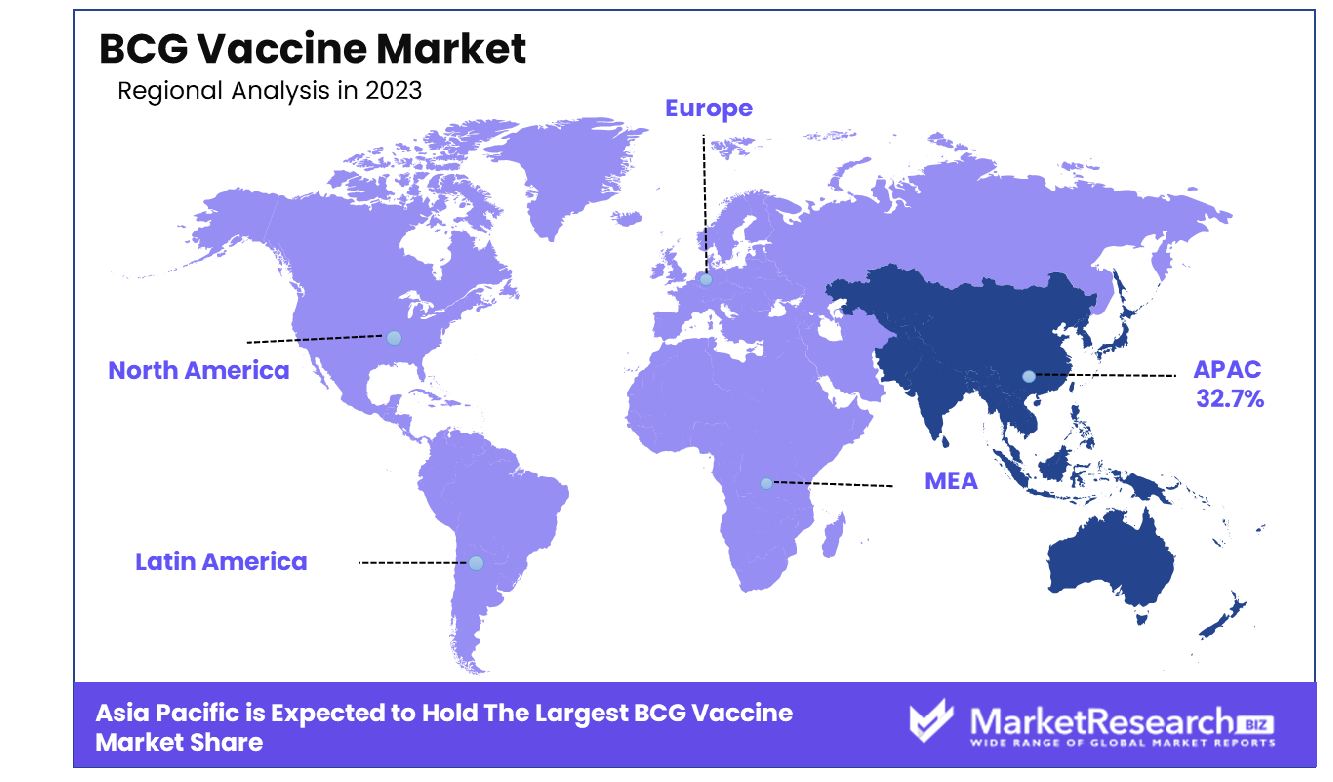
Global BCG Vaccine Market By Age Group(Pediatrics (0-18 Years), Adults (19-35 Years)), By Application(Bladder Cancer, Tuberculosis), By Distribution Channel(Hospital Pharmacy, Online Pharmacy, Retail Pharmacy) , By Region And Companies - Industry Segment Outlook, Market Assessment, Competition Scenario, Trends, And Forecast 2024-2033
-
46948
-
June 2024
-
300
-
-
This report was compiled by Trishita Deb Trishita Deb is an experienced market research and consulting professional with over 7 years of expertise across healthcare, consumer goods, and materials, contributing to over 400 healthcare-related reports. Correspondence Team Lead- Healthcare Linkedin | Detailed Market research Methodology Our methodology involves a mix of primary research, including interviews with leading mental health experts, and secondary research from reputable medical journals and databases. View Detailed Methodology Page
-
Quick Navigation
Report Overview
The Global BCG Vaccine Market was valued at USD 97.1 Million in 2023. It is expected to reach USD 162.2 Million by 2033, with a CAGR of 5.40% during the forecast period from 2024 to 2033.
The BCG Vaccine Market refers to the segment of the pharmaceutical industry dedicated to Bacillus Calmette-Guérin (BCG) vaccines, primarily used for immunization against tuberculosis (TB) and other related diseases. It encompasses the production, distribution, and utilization of these vaccines worldwide. With a history dating back to the early 20th century, the market has evolved to address changing disease patterns, global health initiatives, and advancements in vaccine technology.
Key stakeholders, including Product Managers, engage in strategic planning, market analysis, and product development to navigate the dynamic landscape of BCG vaccine procurement, delivery, and efficacy.

The BCG vaccine market continues to exhibit promising growth prospects, fueled by sustained demand for tuberculosis (TB) prevention measures worldwide. With a robust historical track record and ongoing efforts to combat TB, particularly in high-burden regions, the market's trajectory remains favorable.
In Mexico, where BCG vaccine coverage has consistently reached 90% or higher since 2006, barring minor fluctuations, the sustained adoption underscores the nation's commitment to public health initiatives. Variations in acquired doses and coverage rates annually reflect dynamic healthcare landscapes and targeted interventions to optimize immunization efforts.
Similarly, in the UK, recent coverage assessments reveal encouraging trends, with 68.8% coverage observed at three months for children born in the third quarter of 2022, and 78.7% coverage at 12 months for those born in the fourth quarter of 2021. These metrics underscore concerted efforts to ensure timely immunization and mitigate TB risks among vulnerable populations.
Such data underscores the resilience and adaptability of the BCG vaccine market, as stakeholders navigate evolving healthcare priorities and regulatory landscapes. Moving forward, strategic collaborations, innovative distribution channels, and heightened public awareness campaigns will be pivotal in sustaining market momentum and advancing global TB eradication goals.
Key Takeaways
- Market Growth: The Global BCG Vaccine Market was valued at USD 97.1 Million in 2023. It is expected to reach USD 162.2 Million by 2033, with a CAGR of 5.40% during the forecast period from 2024 to 2033.
- By Age Group: Pediatrics, covering ages 0-18, dominated with a commanding 57% market share.
- By Application: Tuberculosis, in terms of application, held a dominant 62% share.
- By Distribution Channel: Retail pharmacy emerged as the leading distribution channel, commanding a 39% share.
- Regional Dominance: In the Asia-Pacific region, the BCG vaccine market accounts for 32.7%.
- Growth Opportunity: Global vaccination initiatives fuel market growth, while untapped markets in developing regions offer lucrative expansion opportunities.
Driving factors
Rising Prevalence of Tuberculosis Driving BCG Vaccine Market Growth
The escalating prevalence of tuberculosis (TB), particularly in developing and underdeveloped nations, significantly propels the growth of the BCG vaccine market. According to recent statistics, TB remains a major global health concern, with millions of new cases reported annually, predominantly in regions with limited access to healthcare infrastructure and resources. This surge in TB incidence underscores the urgent need for preventive measures, including vaccination.
In countries where TB incidence rates are high, such as India, China, and parts of Africa, the demand for BCG vaccines has surged in response to the disease burden. The BCG vaccine, which offers protection against severe forms of TB, is increasingly sought after by healthcare providers and governments striving to curb the spread of the disease. As a result, pharmaceutical companies are ramping up production to meet the escalating demand, thereby driving market growth.
Government Support and Initiatives Fueling BCG Vaccine Market Expansion
The growth of the BCG vaccine market is further bolstered by increasing government support and initiatives aimed at promoting vaccination programs. Governments worldwide are recognizing the pivotal role of immunization in combating infectious diseases like TB and are allocating substantial funds to support vaccination campaigns.
Through proactive measures such as subsidizing vaccine costs, implementing mass vaccination drives, and integrating BCG vaccination into national immunization schedules, governments are fostering widespread access to BCG vaccines. These initiatives not only facilitate vaccine uptake but also contribute to raising awareness about the importance of TB prevention, thereby driving market growth.
Growing Public Awareness Driving Demand for BCG Vaccines
The burgeoning awareness among individuals about the severity of tuberculosis and the importance of vaccination is a significant driver of market growth. With increasing access to information through various channels, including healthcare professionals, media campaigns, and educational programs, people are becoming more cognizant of the risks posed by TB and the efficacy of preventive measures such as vaccination.
This heightened awareness has translated into a growing demand for BCG vaccines, particularly among populations at higher risk of TB exposure. Individuals are proactively seeking vaccination for themselves and their families, contributing to market expansion. Additionally, advocacy efforts by healthcare organizations and non-governmental organizations (NGOs) are instrumental in disseminating accurate information about TB prevention and promoting vaccine uptake, further fueling market growth.
Restraining Factors
Scarcity and Inaccessibility of Raw Materials Impede BCG Vaccine Market Growth
The scarcity and inaccessibility of raw materials pose significant challenges to the expansion of the BCG vaccine market. Raw materials essential for BCG vaccine production, such as live attenuated strains of Mycobacterium bovis, are limited in availability and subject to stringent regulatory requirements. Shortages or disruptions in the supply chain can impede vaccine production, leading to fluctuations in market supply and pricing.
Moreover, the inaccessibility of raw materials in certain regions, particularly in developing countries with limited infrastructure and resources, exacerbates the problem. This disparity in access hampers the ability of local manufacturers to produce BCG vaccines, thereby limiting market growth opportunities in these areas.
To mitigate the impact of raw material scarcity, stakeholders in the BCG vaccine market need to diversify their supplier base, invest in research and development to explore alternative sources or production methods and collaborate with regulatory authorities to streamline the procurement process.
Dependence on a Single Vaccine Producer Hinders BCG Vaccine Market Expansion
The market's dependence on a single vaccine producer poses a significant constraint on its growth potential. In some regions, BCG vaccine supply is monopolized by a single manufacturer, resulting in limited competition and market dynamics that favor the producer rather than consumers.
This dependence not only restricts market access but also exposes stakeholders to the risk of supply disruptions and price fluctuations caused by factors such as production delays, regulatory issues, or unforeseen events.
To address this challenge, efforts should be made to promote competition and diversification in the BCG vaccine market. This can be achieved through initiatives to encourage new entrants, foster partnerships between manufacturers, and incentivize investment in vaccine production infrastructure. By reducing reliance on a single producer, the market can enhance resilience, improve accessibility, and stimulate innovation, thereby driving sustainable growth in BCG vaccine uptake and availability worldwide.
By Age Group Analysis
In the pediatrics segment, ages 0 to 18 years dominate the market share at 57%.
In 2023, Pediatrics (0-18 Years) held a dominant market position in the By Age Group segment of the BCG Vaccine Market, capturing more than a 57% share. This segment's robust performance can be attributed to several factors, including the widespread adoption of BCG vaccination programs in pediatric populations worldwide, driven by its efficacy in preventing severe forms of tuberculosis (TB) in children. Moreover, government initiatives and vaccination drives aimed at immunizing infants and young children against TB have significantly contributed to the segment's growth.
Adults (19-35 Years), the second-largest segment in the BCG Vaccine Market by age group, exhibited steady growth in 2023. This segment accounted for a substantial portion of the market share, indicating a growing awareness among adults about the importance of BCG vaccination in preventing TB and other related diseases. Factors such as increasing healthcare awareness, rising incidences of TB among young adults, and initiatives promoting adult vaccination programs have bolstered the demand for BCG vaccines in this age group.
Looking ahead, the By Age Group segment of the BCG Vaccine Market is poised for further expansion, driven by continuous efforts to enhance vaccination coverage across all age groups. Government initiatives, coupled with advancements in healthcare infrastructure and increasing investments in immunization programs, are expected to fuel market growth. Additionally, the ongoing research and development activities aimed at developing improved BCG vaccine formulations tailored to specific age groups are anticipated to create new growth opportunities in the market.
By Application Analysis
Tuberculosis applications lead the way, capturing a significant share of 62%.
In 2023, Tuberculosis held a dominant market position in the By Application segment of the BCG Vaccine Market, capturing more than a 62% share. This commanding share is primarily attributed to the widespread use of BCG vaccines in the prevention of tuberculosis, making it the cornerstone of tuberculosis control programs globally. The efficacy of BCG vaccines in reducing the incidence of TB, particularly in high-burden regions, has propelled their adoption as a preventive measure against this infectious disease.
Bladder Cancer, the second-largest segment in the By Application category of the BCG Vaccine Market, exhibited notable growth in 2023. While accounting for a significant portion of the market share, this segment trailed behind tuberculosis in terms of market dominance. The utilization of BCG vaccines in the treatment of early-stage bladder cancer, particularly for reducing tumor recurrence rates and preventing disease progression, has bolstered demand within this segment. Clinical evidence supporting the efficacy of BCG immunotherapy in bladder cancer management has contributed to its steady market growth.
Looking forward, the By Application segment of the BCG Vaccine Market is poised for continued expansion, driven by increasing efforts to combat tuberculosis and bladder cancer worldwide. Government-led initiatives, coupled with ongoing research and development endeavors aimed at enhancing the therapeutic efficacy of BCG vaccines, are anticipated to further propel market growth. Additionally, strategic collaborations between healthcare organizations and vaccine manufacturers to expand access to BCG vaccines in both developed and developing regions will play a pivotal role in shaping the market landscape.

By Distribution Channel Analysis
Retail pharmacy emerges as the preferred distribution channel, commanding a dominant share of 39%.
In 2023, Retail Pharmacy held a dominant market position in the Distribution Channel segment of the BCG Vaccine Market, capturing more than a 39% share. Retail pharmacies have emerged as key distribution channels for BCG vaccines, catering to a wide range of consumers seeking preventive healthcare solutions. This segment's growth is propelled by several factors, including the widespread accessibility of retail pharmacies, convenience in vaccine procurement, and the increasing emphasis on immunization programs globally.
Hospital Pharmacy, Online Pharmacy, and Retail Pharmacy are the primary distribution channels facilitating the dissemination of BCG vaccines. Among these, Retail Pharmacy has exhibited remarkable growth, buoyed by its extensive network, efficient inventory management systems, and personalized customer service. Additionally, the rising trend of self-medication and over-the-counter purchases further amplifies the significance of Retail Pharmacy in the BCG vaccine market landscape.
The dominance of Retail Pharmacy can be attributed to its strategic location within communities, offering accessibility and convenience to a diverse demographic of consumers. Moreover, the growing prevalence of tuberculosis, coupled with the expansion of vaccination programs in emerging economies, has fueled the demand for BCG vaccines, thereby bolstering Retail Pharmacy's market presence.
Furthermore, advancements in pharmaceutical logistics and distribution technologies have enhanced the efficiency of Retail Pharmacy operations, ensuring timely availability of BCG vaccines to meet consumer demand. Market players are increasingly focusing on collaborations and partnerships with retail pharmacy chains to expand their market reach and capitalize on emerging opportunities in the BCG vaccine segment.
Looking ahead, Retail Pharmacy is poised to maintain its dominant position in the Distribution Channel segment of the BCG Vaccine Market, driven by continuous innovation, strategic alliances, and the evolving landscape of preventive healthcare. As healthcare systems worldwide prioritize immunization initiatives, Retail Pharmacy is anticipated to play a pivotal role in facilitating access to BCG vaccines, thereby contributing to the overall public health agenda.
Key Market Segments
By Age Group
- Pediatrics (0-18 Years)
- Adults (19-35 Years)
By Application
- Bladder Cancer
- Tuberculosis
By Distribution Channel
- Hospital Pharmacy
- Online Pharmacy
- Retail Pharmacy
Growth Opportunity
Immunization Programs Driving Market Expansion
The growth trajectory of the global BCG vaccine market in 2023 is heavily influenced by concerted efforts in immunization programs worldwide. Governments and health organizations continue to prioritize vaccination initiatives to combat tuberculosis vaccine treatment(TB) and other diseases.
Immunization campaigns, especially in emerging economies, play a pivotal role in augmenting the demand for BCG vaccines. With increased awareness about the importance of preventive healthcare, coupled with enhanced accessibility to vaccination services, the market witnesses a substantial surge in demand.
Untapped Opportunities in Developing Regions
One of the key drivers propelling the growth of the BCG vaccine market in 2023 is the untapped potential in developing regions. While established markets exhibit saturation, emerging economies present promising opportunities for market expansion.
The rising incidence of TB in these regions, coupled with governmental initiatives to address healthcare disparities, fosters a conducive environment for market penetration. Moreover, the growing emphasis on universal healthcare coverage and the expansion of immunization programs further bolster market growth prospects.
Latest Trends
Government Backing Fuels Vaccination Campaigns
In 2023, a prominent trend shaping the global BCG vaccine market is the steadfast support from governments towards vaccination campaigns. Recognizing the pivotal role of immunization in disease prevention, governments worldwide are allocating substantial resources to bolster vaccination initiatives.
This unwavering support not only enhances public awareness but also ensures widespread accessibility to BCG vaccines. Consequently, the market experiences a notable surge in demand, particularly in regions with high TB prevalence.
Escalating Incidence of Multidrug-Resistant TB Strains
Another significant trend observed in 2023 is the alarming rise in multidrug-resistant tuberculosis (MDR-TB) strains, driving the urgent need for effective preventive measures. The emergence of drug-resistant TB strains poses a formidable challenge to global health systems, necessitating intensified efforts in TB control and prevention.
In this context, BCG vaccination gains prominence as a crucial intervention strategy against TB transmission. Healthcare authorities and organizations prioritize the development and distribution of BCG vaccines tailored to combat MDR-TB strains, further amplifying market demand.
Regional Analysis
The Asia-Pacific region accounts for a significant market share of 32.7% in the BCG vaccine market.
North America With a robust healthcare infrastructure and high awareness regarding preventive healthcare measures, North America holds a significant share in the BCG vaccine market. The region benefits from advanced research facilities and extensive government initiatives promoting vaccination programs. According to recent data, North America accounted for approximately 28% of the global BCG vaccine market in 2023, reflecting its prominence in the industry.
Europe represents another vital market for BCG vaccines, characterized by widespread immunization programs and stringent regulatory frameworks. The region's emphasis on disease prevention and healthcare accessibility contributes to its substantial market share. In 2023, Europe held approximately 25% of the global BCG vaccine market, reflecting its established healthcare infrastructure and commitment to public health.
Asia Pacific Emerging economies in the Asia Pacific region demonstrate significant growth potential for the BCG vaccine market. Rapid population growth, coupled with increasing healthcare expenditure and government initiatives to combat infectious diseases, drive market expansion in this region. Asia Pacific emerged as the dominating region in the global BCG vaccine market, commanding a notable share of 32.7% in 2023. This growth is attributed to the large population base and rising awareness regarding the importance of vaccination.
Middle East & Africa and Latin America These regions present evolving landscapes for the BCG vaccine market, characterized by improving healthcare infrastructure and growing awareness regarding disease prevention. While currently holding smaller market shares compared to other regions, Middle East & Africa and Latin America exhibit untapped potential for market expansion, driven by increasing healthcare investments and rising disease burden.

Key Regions and Countries
North America
- The US
- Canada
- Rest of North America
Europe
- Germany
- France
- The UK
- Spain
- Netherlands
- Russia
- Italy
- Rest of Europe
Asia-Pacific
- China
- Japan
- Singapore
- Thailand
- South Korea
- Vietnam
- India
- New Zealand
- Rest of Asia Pacific
Latin America
- Mexico
- Brazil
- Rest of Latin America
Middle East & Africa
- Saudi Arabia
- South Africa
- UAE
- Rest of Middle East & Africa
Key Players Analysis
In 2023, the global BCG vaccine market witnessed significant activity from key players, each contributing to the market's growth trajectory and competitive landscape. Among these, Sanofi Pasteur stands out as a leading player, leveraging its extensive experience and robust R&D capabilities to maintain a prominent position in the market. With a diverse portfolio of vaccines and a strong global presence, Sanofi Pasteur continues to play a pivotal role in shaping the BCG vaccine market dynamics.
China National Biotec Group (CNBG) emerges as another key player, capitalizing on China's vast market potential and its strategic focus on healthcare innovation. As a state-owned enterprise, CNBG benefits from extensive government support and investments, enabling it to drive innovation and expand its market reach both domestically and internationally.
Merck & Co., Inc. remains a formidable player in the global BCG vaccine market, leveraging its strong brand reputation and global distribution network to penetrate diverse markets. With a commitment to research excellence and quality assurance, Merck continues to foster trust among healthcare professionals and consumers alike.
Other notable players such as Japan BCG Laboratory, Serum Institute of India Pvt. Ltd., and InterVax Ltd. contribute to the market's competitiveness through their specialized expertise and regional market insights. Their strategic collaborations, regulatory compliance, and focus on product innovation further strengthen their market positions.
Market Key Players
- Sanofi Pasteur
- China National Biotec Group
- Merck & Co., Inc.
- Japan BCG Laboratory
- Serum Institute of India Pvt. Ltd.
- InterVax Ltd.
- Biofabri
- AJ Biologics
- GreenSignal Bio Pharma Limited (GSBPL)
- Torlak Institute of Virology
- Other Key Players
Recent Development
- In May 2024, PS Kimtai allocates Ksh1.2B to procure vaccines amid a shortage in Kenya. Ministry of Health acknowledges low stock levels for children's vaccines and plans redistribution to avert a crisis.
- In February 2024, a UC Davis Health study reveals the BCG vaccine's potential in treating hepatocellular carcinoma (HCC), reducing tumor burden and prolonging survival in mice. Breakthrough offers hope for effective liver cancer treatment.
Report Scope
Report Features Description Market Value (2023) USD 97.1 Million Forecast Revenue (2033) USD 162.2 Million CAGR (2024-2032) 5.40% Base Year for Estimation 2023 Historic Period 2016-2023 Forecast Period 2024-2033 Report Coverage Revenue Forecast, Market Dynamics, COVID-19 Impact, Competitive Landscape, Recent Developments Segments Covered By Age Group(Pediatrics (0-18 Years), Adults (19-35 Years)), By Application(Bladder Cancer, Tuberculosis), By Distribution Channel(Hospital Pharmacy, Online Pharmacy, Retail Pharmacy) Regional Analysis North America - The US, Canada, Rest of North America, Europe - Germany, France, The UK, Spain, Italy, Russia, Netherlands, Rest of Europe, Asia-Pacific - China, Japan, South Korea, India, New Zealand, Singapore, Thailand, Vietnam, Rest of Asia Pacific, Latin America - Brazil, Mexico, Rest of Latin America, Middle East & Africa - South Africa, Saudi Arabia, UAE, Rest of Middle East & Africa Competitive Landscape Sanofi Pasteur, China National Biotec Group, Merck & Co., Inc., Japan BCG Laboratory, Serum Institute of India Pvt. Ltd., InterVax Ltd., Biofabri, AJ Biologics, GreenSignal Bio Pharma Limited (GSBPL), Torlak Institute of Virology, Other Key Players Customization Scope Customization for segments, region/country-level will be provided. Moreover, additional customization can be done based on the requirements. Purchase Options We have three licenses to opt for Single User License, Multi-User License (Up to 5 Users), Corporate Use License (Unlimited User and Printable PDF) -
-
- Sanofi Pasteur
- China National Biotec Group
- Merck & Co., Inc.
- Japan BCG Laboratory
- Serum Institute of India Pvt. Ltd.
- InterVax Ltd.
- Biofabri
- AJ Biologics
- GreenSignal Bio Pharma Limited (GSBPL)
- Torlak Institute of Virology
- Other Key Players




